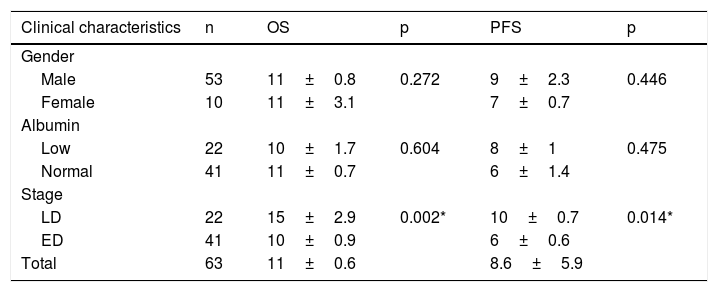El propósito del presente estudio es determinar el valor pronóstico de los parámetros metabólicos relacionados con los tumores primarios detectados en los exámenes por tomografía por emisión de positrones/tomografía computarizada (PET/TC) del pretratamiento flúor-18 2-fluoro-2-desoxi-D-glucosa (18F FDG) de pacientes a los que se les ha diagnosticado cáncer pulmonar de células pequeñas (SCLC, por sus siglas en inglés).
Materiales y métodosEn este estudio retrospectivo se inscribieron 63 pacientes con un diagnóstico histopatológicamente confirmado de SCLC a los que se les aplicó un escáner PET/TC con 18F FDG en la línea basal. Se registraron la etapa de la enfermedad, la edad en su diagnóstico, el sexo, el nivel de albúmina y el valor máximo de captación estándar (SUVmax), SUVmean, el volumen de tumor metabólico (MTV) y los valores de glucólisis total de la lesión) relacionados con el tumor primario en el escáner PET de línea basal y se evaluó la relación de estos factores con la supervivencia libre de progresión (PFS) y la supervivencia global (OS).
ResultadosEl estudio incluyó un total de 63 pacientes (10 mujeres, 53 hombres, con una edad media de 64,8 y un rango de edad de 43-82 años), 22 de los cuales tenía enfermedad limitada (LD) y 41 tenía enfermedad extendida (ED). Los OS y PFS fueron significativamente mayores en pacientes con LD que en pacientes con ED (15±2,9 ante 10±0,9 meses, p=0,002 para OS; 10±0,7 ante 6±0,6 meses, p=0,014 para PFS). Sin embargo, no se identificó una relación estadísticamente significativa entre el sexo, el nivel de albúmina, la edad y los niveles SUVmax, SUVmean, MTV y TLG relacionados con el tumor primario y PFS u OS.
Conclusiónel presente estudio descubrió que los parámetros PET del pretratamiento no tenían valor predictivo para el PFS y OS en pacientes con SCLC.
The aim in the present study is to determine the prognostic value of metabolic parameters related to the primary tumors detected in pretreatment Fluorine-18 2-fluoro-2-Deoxy-D-glucose (18F FDG) positron emission tomography/computerized tomography (PET/CT) scans of patients diagnosed with small-cell lung cancer (SCLC).
Material and MethodsEnrolled in this retrospective study were 63 patients with a histopathologically confirmed diagnosis of SCLC who underwent an 18F FDG PET/CT scan at baseline. Disease stage, age at diagnosis, gender, albumin level and maximum standardized uptake value (SUVmax), SUVmean, metabolic tumor volume (MTV) and total lesion glycolysis (TLG) values related to the primary tumor at the baseline PET scan were recorded, and the relationship of these factors with progression-free survival (PFS) and overall survival (OS) was evaluated.
ResultsThe study included a total of 63 patients (10 female, 53 male, mean age of 64.8 and age range of 43–82 years), 22 of which had limited disease (LD) and 41 had extensive disease (ED). The OS and PFS were significantly higher in patients with LD than in patients with ED (15±2.9 vs. 10±0.9 months, p=0.002 for OS; 10±0.7 vs. 6±0.6 months, p=0.014 for PFS). However, no statistically significant relationship was identified between gender, albumin level, age and SUVmax, SUVmean, MTV, TLG values related to the primary tumor and PFS or OS.
ConclusionThe present study found that pretreatment PET parameters were of not predictive value for PFS and OS in patients with SCLC.
Artículo

Revista Española de Medicina Nuclear e Imagen Molecular (English Edition)
Comprando el artículo el PDF del mismo podrá ser descargado
Precio 19,34 €
Comprar ahora










